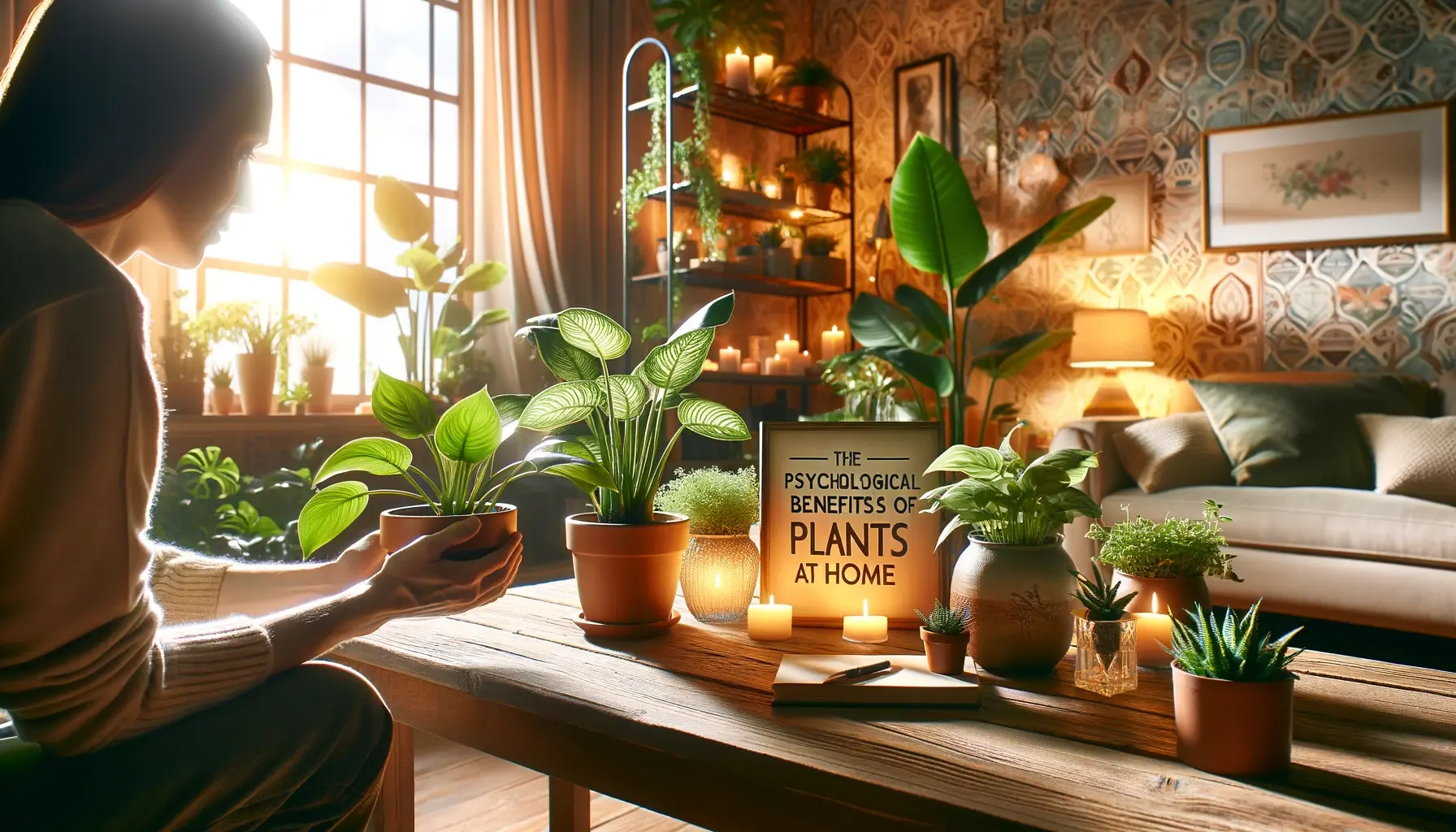The Psychological Benefits of Growing Plants at Home

Have you ever wondered why so many people are bringing the outdoors inside? Indoor gardening isn’t just a trendy hobby – it’s a powerful way to boost your mental health and overall well-being. In this article, we’ll explore the fascinating psychological benefits of plants and how they can transform your living space into a sanctuary of calm and positivity.
The Connection Between Nature and Mental Well-being
Imagine feeling instantly calmer just by looking at a leafy green plant. It’s not just your imagination – there’s science behind it! This connection is called the biophilia hypothesis, which suggests that humans have an innate need to connect with nature.
Research backs this up:
- A study in the Journal of Physiological Anthropology found that interacting with indoor plants can reduce stress and promote comfort.
- Another study published in HortTechnology showed that office workers with plants in their workspace reported feeling more satisfied and focused.
These findings highlight the powerful impact of indoor gardening on mental health, making it clear why more people are turning their homes into green havens.
Stress Reduction and Relaxation
Feeling overwhelmed by daily stress? Your indoor plants might be the answer! Tending to plants can lower your cortisol levels – that’s the hormone responsible for stress. It’s like a natural chill pill!
Here are some simple plant-care activities that can help you relax:
- Gently wiping leaves to remove dust
- Pruning dead leaves or stems
- Repotting a plant that’s outgrown its container
- Misting plants that enjoy humidity
These tasks aren’t just good for your plants – they’re meditative moments that can calm your mind and soothe your nerves.
Boosting Mood and Fighting Depression
Indoor gardening isn’t just about stress relief – it’s a mood booster too! Caring for plants can increase levels of serotonin and dopamine in your brain. These are the “feel-good” chemicals that help fight off the blues.
Case Study: A mental health clinic in London introduced gardening therapy for patients with depression. After just three months, 80% of participants reported improved mood and decreased anxiety symptoms.
Enhancing Cognitive Function
Did you know that your leafy friends can help sharpen your mind? Indoor gardening and plant care can improve your concentration and memory. Part of this is due to the cleaner air that plants provide, which can boost brain function.
Here’s a table of common indoor plants and their air-purifying qualities:
| Plant Name | Air-Purifying Benefits |
|---|---|
| Spider Plant | Removes formaldehyde and xylene |
| Peace Lily | Filters benzene and trichloroethylene |
| Snake Plant | Absorbs nitrogen oxides and formaldehyde |
| Aloe Vera | Clears formaldehyde and benzene |
| Boston Fern | Eliminates xylene and formaldehyde |
By surrounding yourself with these natural air purifiers, you’re creating an environment that supports better thinking and mental clarity.
Fostering a Sense of Achievement and Purpose
There’s something incredibly rewarding about nurturing a living thing and watching it thrive. Indoor gardening provides a sense of purpose and achievement that can significantly boost your mental well-being.
Milestones in plant care that provide a sense of accomplishment:
- Seeing a new leaf unfurl
- Successfully propagating a cutting
- Nursing a struggling plant back to health
- Witnessing your first bloom
These small victories mirror personal growth, reminding us that with care and patience, we too can flourish.
Building Patience and Mindfulness
In our fast-paced world, plants teach us the value of slowing down. Watching a plant grow encourages us to appreciate gradual change and live in the present moment.
Tips for mindful gardening practices:
- Observe your plants closely each day, noting small changes
- Practice deep breathing while watering your plants
- Feel the texture of the soil as you repot a plant
- Appreciate the scent of herbs or flowering plants
By incorporating these mindful practices into your plant care routine, you’re not just nurturing your plants – you’re cultivating inner peace.
Improving Self-esteem and Confidence
Successfully growing plants can be a real confidence booster. As you develop new skills and see the results of your care, your self-esteem grows along with your plants.
Here’s a list of easy-to-grow plants for beginners to boost confidence:
- Pothos (Devil’s Ivy)
- ZZ Plant
- Succulents (like Echeveria or Jade Plant)
- Chinese Evergreen
- Philodendron
Starting with these hardy plants can help you build your gardening skills and confidence, setting you up for success in your indoor gardening journey.
Creating a Calming Environment
Plants don’t just clean the air; they transform the entire atmosphere of your home. A room filled with greenery can become a personal oasis, offering visual and olfactory benefits that promote relaxation and well-being.
Suggestions for incorporating plants into home decor for maximum psychological benefit:
- Place a large, leafy plant like a Monstera or Fiddle Leaf Fig in your living room as a focal point
- Hang trailing plants like Pothos or String of Pearls in your bedroom for a soothing, cascading effect
- Add fragrant herbs like lavender or rosemary to your kitchen for aromatherapy benefits
- Create a small zen garden with succulents and pebbles on your work desk
Social Benefits and Community Connection
Indoor gardening isn’t just a solitary pursuit – it can be a wonderful way to connect with others. Plant enthusiasts often form vibrant communities, both online and offline, sharing tips, cuttings, and the joys of plant parenthood.
Ideas for plant-related social activities:
- Join a local plant swap event
- Participate in online plant forums or social media groups
- Attend workshops at your local nursery or botanical garden
- Start a plant club with friends or colleagues
These activities not only expand your plant knowledge but also help build meaningful connections with like-minded individuals.
Therapeutic Applications of Indoor Gardening
The benefits of indoor gardening extend beyond personal enjoyment – it’s increasingly recognized as a valuable therapeutic tool. Horticultural therapy uses plant-based activities to support mental health treatment and rehabilitation.
Case Study: A mental health facility in Chicago implemented an indoor gardening program for patients with anxiety disorders. After six weeks, participants reported a 40% reduction in anxiety symptoms and improved social interactions.
Getting Started with Indoor Plants
Ready to reap the psychological benefits of plants? Here’s how to get started:
Essential tools and supplies for indoor gardening:
- Quality potting soil
- Watering can or spray bottle
- Pruning shears
- Plant food or fertilizer
- Pots with drainage holes
Recommendations for low-maintenance plants to start with:
- Snake Plant (Sansevieria)
- Spider Plant
- Pothos
- ZZ Plant
- Rubber Plant
Remember, start small and gradually expand your indoor garden as you gain confidence and experience.
Conclusion
From stress reduction and mood enhancement to improved cognitive function and social connections, the psychological benefits of growing plants at home are truly remarkable. By bringing a bit of nature indoors, you’re not just decorating your space – you’re investing in your mental health and overall well-being.
So why not start your indoor gardening journey today? Whether you’re a seasoned plant parent or a curious beginner, there’s always room for more green in your life. Your mind (and your home) will thank you for it!
Remember, every leaf, every bloom, and every new shoot is a step towards a happier, healthier you. Happy planting!



